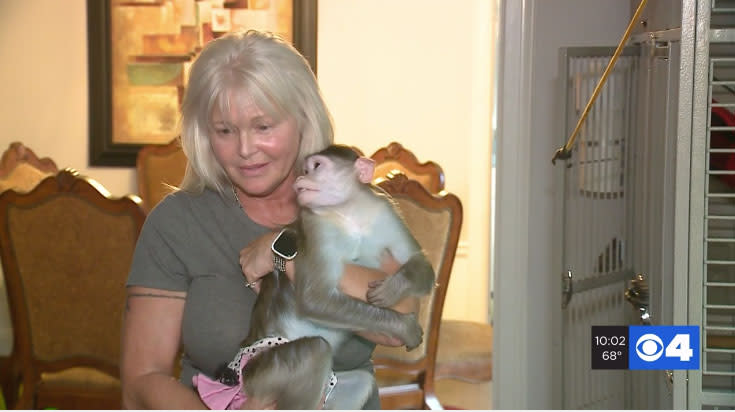Woman fights to keep her 3 emotional support monkeys: ‘They are not dangerous animals’

A woman is fighting with the city of Creve Coeur, Missouri, to keep her three pet monkeys, which she says serve as emotional support animals.
Texanne McBride-Teahan keeps a black-capped capuchin named Paula, a bonnet macaque named Kalie Anna, and a patas monkey named Zoey in her rental home, according to CNN. But about a month after moving in, a neighbor spotted one of her monkeys and, worried about safety, alerted the city.
"It's a wild animal," Jim Hentschell, who lives next door to McBride-Teahan, told KMOV4. "They belong in zoos, you know, or in their natural habitat. Everything I hear about emotional support animals, they only speak about cats and dogs."
The city of Creve Coeur seems to agree, stating that non-human primates (which includes monkeys), along with alligators, pythons, and lions, are considered an "inherently dangerous animal," according to KMOV4, and are not allowed in residential areas.
But McBride-Teahan, who received a citation from the city, defended her pets in a city council meeting on Sept. 9: "They are not dangerous animals. They are trained. They assist me. I have PTSD because of something that happened to me, a very bad thing that happened to me a long time ago."
Don Sherman, McBride-Teahan’s attorney, tells Yahoo Lifestyle: “She suffers from PTSD as a result of a traumatic incident that happened when she was a child. It’s of a very personal nature. It’s beyond horrible. Picture a nightmare scenario and you won’t be too far away.”
Sherman notes that McBride-Teahan has a physician’s letter that confirms her monkeys are emotional support animals to help with her mental health. “I do have a doctor’s prescription letter,” McBride-Teachan tells Yahoo Lifestyle.
Her lawyer also says that McBride-Teahan keeps her monkeys, who weigh between five and eight pounds, at home and does not take them to public spaces. “There has never been an incident,” Sherman tells Yahoo Lifestyle. “Never been a bite. This has been blown out of proportion.”
Emotional support animals (ESAs) differ from service animals, which, under the Americans with Disabilities Act (ADA) are defined as dogs that have been individually “trained to do work or perform tasks for people with disabilities,” according to the U.S. Department of Justice. Service animals are also allowed in most public spaces, including restaurants and hotels.
While emotional support animals aren’t trained for specific tasks and aren’t covered under the ADA, their owners do have certain rights under the Fair Housing Act — namely, housing that would otherwise prohibit pets must allow emotional support animals and other assistance animals. “We believe her rights are fully protected under Fair Housing Act,” says Sherman.
Research shows that pets help relieve stress — one 2019 study found that just petting a dog or cat for 10 minutes significantly reduced the stress hormone cortisol. But other research — including a 2018 analysis of 17 different studies on companion animals and mental health — has been mixed. That said, the analysis did find that “pets provide benefits to those with mental health conditions” and that there are ”multi-faceted ways in which pets contributed to the work associated with managing a mental health condition, particularly in times of crisis.”
For McBride-Teahan, who has trained and lived with monkeys for 20 years, she worries that her monkeys could be taken away.
“Unequivocally, she has a very real disability,” her lawyer says. “All she wants is to be left alone.”
McBride-Teahan is scheduled to appear in court in November.
Read more from Yahoo Lifestyle:
A new cat allergy vaccine may make sniffling and sneezing a thing of the past
What pet owners should know about toxic algae blooms: 'Dogs can die within minutes'
Follow us on Instagram, Facebook and Twitter for nonstop inspiration delivered fresh to your feed, every day.

